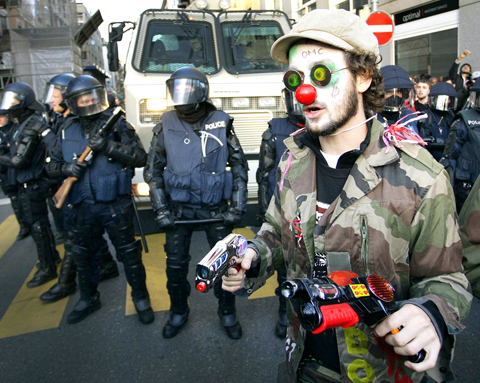Police fired tear gas and rubber bullets on Saturday to separate violent demonstrators from a protest against a meeting of top WTO officials, but the hooded “black bloc” activists were able to cause damage before 14 were arrested.
The protesters set fire to at least four cars, broke shop windows and committed other acts of violence on Saturday, police spokesman Patrick Puhl said.
Police Chief Monica Bonfati said officers arrested four looters in addition to the protesters. No injuries to police or protesters were reported, police said.

PHOTO: REUTERS
The clashes occurred during a march by demonstrators protesting a meeting of the WTO scheduled to start today, in which the US, China and other powers will spearhead a new attempt to find ways to revive world trade and drag the global economy out of recession.
Bonfati told Swiss television station TSR that police were able at the beginning of the demonstration to identify about 200 members of the black bloc — violent elements that join other demonstrations to cause damage. She said they were spread out along the route and police had to separate them from the other protesters.
Eric Grandjean, another police spokesman, said black bloc protesters threw firebombs at police from the march.
Police said the 3,000 protesters included three distinct groups of troublemakers who broke away to attack cars and hotel and shop windows, then rejoined the march, pretending to be peaceful.
Organizers said there were about 5,000 protesters in total.
The group Anti-WTO Coordination said it “regretted being unable to finish the demonstration and deliver the planned speeches.” It said a few protesters had used the demonstration for their own ends.
Swiss officials refused entry at Geneva Airport on Friday evening to three South Koreans because Swiss security specialists judged them to be capable of violence, Puhl said, noting that other countries had previously barred the three for the same reason.

CHIP WAR: The new restrictions are expected to cut off China’s access to Taiwan’s technologies, materials and equipment essential to building AI semiconductors Taiwan has blacklisted Huawei Technologies Co (華為) and Semiconductor Manufacturing International Corp (SMIC, 中芯), dealing another major blow to the two companies spearheading China’s efforts to develop cutting-edge artificial intelligence (AI) chip technologies. The Ministry of Economic Affairs’ International Trade Administration has included Huawei, SMIC and several of their subsidiaries in an update of its so-called strategic high-tech commodities entity list, the latest version on its Web site showed on Saturday. It did not publicly announce the change. Other entities on the list include organizations such as the Taliban and al-Qaeda, as well as companies in China, Iran and elsewhere. Local companies need

CRITICISM: It is generally accepted that the Straits Forum is a CCP ‘united front’ platform, and anyone attending should maintain Taiwan’s dignity, the council said The Mainland Affairs Council (MAC) yesterday said it deeply regrets that former president Ma Ying-jeou (馬英九) echoed the Chinese Communist Party’s (CCP) “one China” principle and “united front” tactics by telling the Straits Forum that Taiwanese yearn for both sides of the Taiwan Strait to move toward “peace” and “integration.” The 17th annual Straits Forum yesterday opened in Xiamen, China, and while the Chinese Nationalist Party’s (KMT) local government heads were absent for the first time in 17 years, Ma attended the forum as “former KMT chairperson” and met with Chinese People’s Political Consultative Conference Chairman Wang Huning (王滬寧). Wang

CROSS-STRAIT: The MAC said it barred the Chinese officials from attending an event, because they failed to provide guarantees that Taiwan would be treated with respect The Mainland Affairs Council (MAC) on Friday night defended its decision to bar Chinese officials and tourism representatives from attending a tourism event in Taipei next month, citing the unsafe conditions for Taiwanese in China. The Taipei International Summer Travel Expo, organized by the Taiwan Tourism Exchange Association, is to run from July 18 to 21. China’s Taiwan Affairs Office spokeswoman Zhu Fenglian (朱鳳蓮) on Friday said that representatives from China’s travel industry were excluded from the expo. The Democratic Progressive Party government is obstructing cross-strait tourism exchange in a vain attempt to ignore the mainstream support for peaceful development

ELITE UNIT: President William Lai yesterday praised the National Police Agency’s Special Operations Group after watching it go through assault training and hostage rescue drills The US Navy regularly conducts global war games to develop deterrence strategies against a potential Chinese invasion of Taiwan, aimed at making the nation “a very difficult target to take,” US Acting Chief of Naval Operations James Kilby said on Wednesday. Testifying before the US House of Representatives Armed Services Committee, Kilby said the navy has studied the issue extensively, including routine simulations at the Naval War College. The navy is focused on five key areas: long-range strike capabilities; countering China’s command, control, communications, computers, cyber, intelligence, surveillance, reconnaissance and targeting; terminal ship defense; contested logistics; and nontraditional maritime denial tactics, Kilby